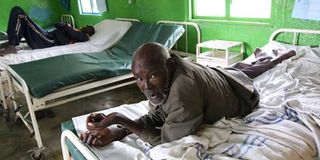Death toll rises as nurses keep equipment under lock and key

Patients at a Meru Teaching and Referral Hospital ward on June 7, 2017. PHOTO | PHOEBE OKALL | NATION MEDIA GROUP
What you need to know:
The few patients at Nyahururu County Referral Hospital, Laikipia, were left on their own and others turned away.
In Narok, only outpatient services were being offered at public health facilities.
In Samburu, key facilities — including Samburu Referral Hospital — were closed.
At least 10 people have died as the nurses’ strike over a collective bargaining agreement (CBA) entered the third day on Wednesday, paralysing services at public hospitals.
An eight-month-old son of a medical doctor at Kakamega General Hospital was the latest victim on Wednesday. Dr Winston Ong’alo told the Nation that his son was diagnosed with severe malaria and anaemia but his colleagues could not access equipment.
“Doctors could not gain access to needles and syringes,” said Dr Ong’alo. “Even more heartbreaking was that oxygen tanks were available but out of reach as the nurses had put them under lock and key.”
On Tuesday, an elderly asthmatic woman, unattended since Monday, died at Baringo County Referral Hospital.
PAY PACKAGES
This came as county governments said they could not afford increments to health workers’ pay packages.
Council of Governors chairman Josephat Nanok on Wednesday said the financial implication of the draft CBA was Sh40.3 billion over four years.
“This amount is around Sh10 billion per year, which is unsustainable bearing in mind that there are other health workers and other sectors delivering services at the county,” said Mr Nanok, the Turkana Governor. “It is important to note that county governments have made increments of Sh3.4 billion.”
He said CoG had proposed an allocation of Sh323 billion for counties but the Senate offered Sh314 billion and the National Assembly Sh291 billion.
Nurses in Nairobi marched to the Salaries and Remuneration Commission (SRC) offices, where they camped for hours demanding to be given audience by chairperson, Sarah Serem.
SUBSTANCE ADDICTION
At Port Reitz District Hospital in Mombasa, at least 30 mentally ill patients and others battling drug and substance addiction were discharged and outpatients turned away from the Coast’s largest public mental health and substance abuse facility.
In Kericho, 10 distraught mothers demanded the release of their underweight infants from incubators, saying they were not being attended to. They included Ms Vivian Chepkemoi, who gave birth to twins a week ago.

Nurses from various hospitals in Nairobi County take to the streets on the second day of the countrywide strike on June 7, 2017. PHOTO | FRANCIS NDERITU | NATION MEDIA GROUP
Relatives of patients at Kisii Teaching and Referral Hospital asked that they be discharged.
Mr Jonathan Mogaka said he was forced to take his son to the private Christa Marianne Mission Hospital in Kisii town.
OUTPATIENT SERVICES
Public hospitals in Vihiga and Kakamega counties only offered outpatient services.
The Vihiga County Health Director, Dr Quido Ahindukha, and Kakamega General Hospital’s Medical Superintendent, Dr John Akoto, said serious cases were referred to private facilities.
“The strike has hampered service delivery,” said Dr Ahindukha.
Kenya National Union of Nurses (Knun) Homa Bay County Branch Executive Secretary George Bola said: “We are sorry for the patients but we can do nothing about it.”
In Nakuru, Nyandarua, Narok, Laikipia and Samburu counties, most public health facilities were deserted.
HIRE HEALTH WORKERS
Nakuru County Health Executive Kabii Mungai said they did not plan to hire health workers as they did during the 100-day doctors’ strike last year.
Deliveries fall
Naivasha Sub-County Hospital’s medical superintendent, Dr Joseph Mburu, said they were relying on more than 40 contracted nurses to give “essential” services while deliveries had fallen by more than 90 per cent.
The few patients at Nyahururu County Referral Hospital, Laikipia, were left on their own and others turned away. The wards were deserted.
In Narok, only outpatient services were being offered at public health facilities while in Samburu, key facilities — including Samburu Referral Hospital — were closed.
Public hospitals in Nyeri stopped admitting patients with the local Knun branch secretary, Ms Beatrice Nduati, saying at least 150 nurses had been transferred and 65 hired.
WON'T RESUME WORK
In Baringo, Knun branch secretary Francis Koros led more than 90 nurses in a demo in Kabarnet town.
“We vow not to resume work until our demands are met,” said Mr Koros.
Meanwhile, nurses have ruled out further talks on the trade dispute lodged by the Council of Governors at the Ministry of Labour. Instead, they have said they will only be involved in talks leading to the CBA.
“The dispute is within the government not with us. We will come tomorrow (Thursday) to talk only on issues that will see us sign the collective bargaining agreement,” said Knun deputy secretary-general Morris Opetu in a statement , hours after the nurses presented their case before Labour CS Phyllis Kandie in a meeting that brought to the table the CoG, led by its CEO, Ms Jacqueline Mogeni.
Reported by Reitz Mureithi, Macharia Mwangi, Steve Njuguna, George Sayagie, Godfrey Oundoh, Winnie Atieno, Elgar Machuka, Judy Mito, Angela Oketch, Anita Chepkoech, Derrick Luvega, Barrack Oduor, Irene Mugo, Faith Nyamai, Florah Koech, David Muchui and Eunice Kilonzo




